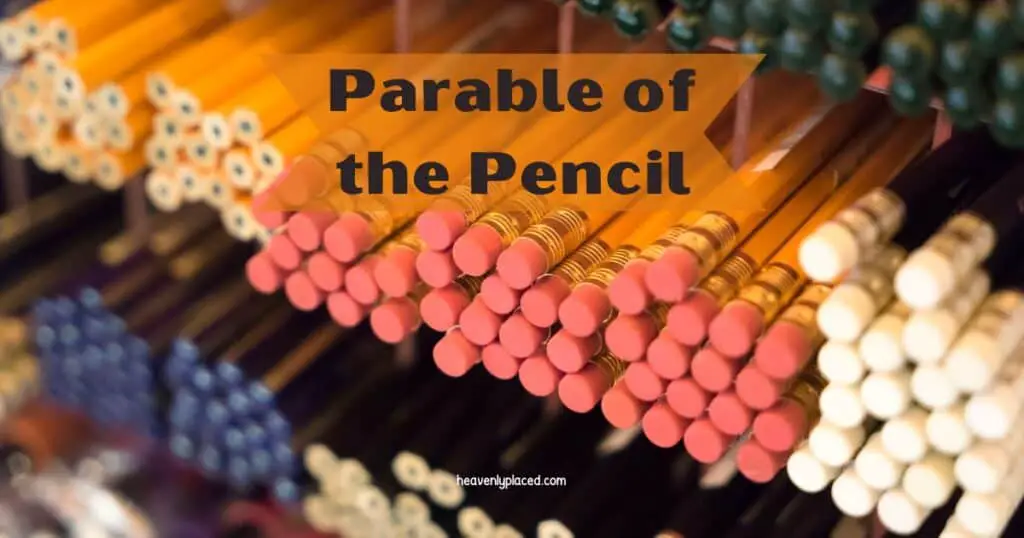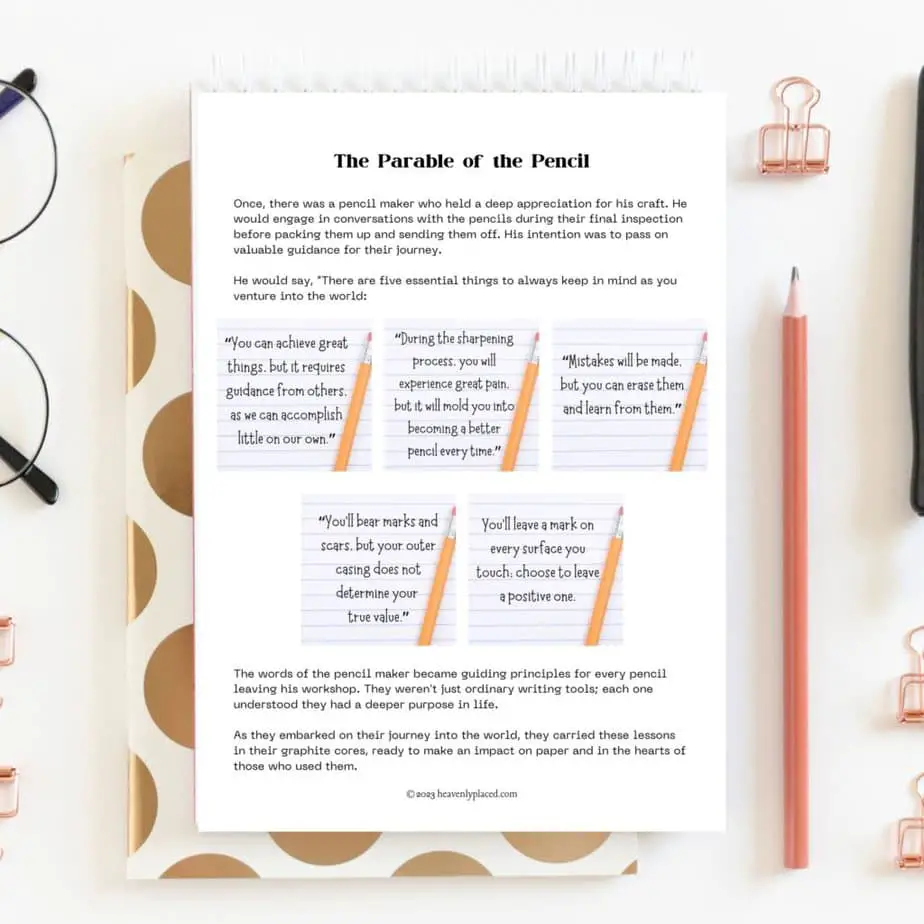The Parable of the Pencil: Stories That Teach Moral Lessons
Parables have a special way of sharing life’s moral lessons, much like how Jesus often conveyed His wisdom through parables. These parables help us comprehend profound truths by embedding them in relatable everyday situations.
While the Parable of the Pencil isn’t found in the Bible, it carries valuable life lessons nonetheless. This parable, frequently used as an inspirational metaphor, recounts the tale of a pencil and the wisdom instilled in it before departing the workshop.

The Parable of the Pencil
Once, there was a pencil maker who held a deep appreciation for his craft. He would engage in conversations with the pencils during their final inspection before packing them up and sending them off. His intention was to pass on valuable guidance for their journey.
He would say, “There are five essential things to always keep in mind as you venture into the world:
- You can achieve great things, but it requires guidance from others, as we can accomplish little on our own.
- During the sharpening process, you will experience great pain, but it will mold you into becoming a better pencil every time.
- Mistakes will be made, but you can erase them and learn from them.
- You’ll bear marks and scars, but your outer casing does not determine your true value.
- You’ll leave a mark on every surface you touch; choose to leave a positive one.”
The words of the pencil maker became guiding principles for every pencil leaving his workshop. They weren’t just ordinary writing tools; each one understood they had a deeper purpose in life.
As they embarked on their journey into the world, they carried these lessons in their graphite cores, ready to make an impact on paper and in the hearts of those who used them.
The Moral Lesson
The parable of the pencil illustrates that, like pencils, human beings possess the potential to achieve great things. We, like the pencils, are the creations of our Creator, who desires us to become the best version of ourselves.
Guiding Hands
The initial lesson underscores the importance of seeking guidance and learning from those who have walked the path before us. As Christians, we find our mentors and teachers in the Bible. Nevertheless, it’s equally crucial to seek out those strong in the faith to hold us accountable. This quest for spiritual growth and the recognition of God’s presence is crucial to becoming the special person we are meant to be.
Proverbs 12:15 advises, “The way of a fool is right in his own eyes, but a wise man listens to advice.”
Sharpening Tools
Life’s trials often test us, as the second lesson emphasizes. The sharpening pain each pencil feels makes it a better pencil for much use. The challenges we encounter and the various problems we face are all part of the process of becoming a stronger person who is more resilient in God’s guiding hand.
Romans 5:3-4 reassures us, “Not only that, but we rejoice in our sufferings, knowing that suffering produces endurance, and endurance produces character, and character produces hope.”
Correcting Mistakes
Mistakes are inevitable, as the third lesson cautions. The eraser on top of the pencil symbolizes the power of learning from errors and growing from them, turning each mistake into a valuable lesson. The most important part for us is that God uses our mistakes as important life lessons that eventually bring us good things and give Him glory.
Psalm 119:71 confirms, “It is good for me that I was afflicted, that I might learn your statutes.”
Life’s Imperfections
The marks and scars on the pencils serve as a reminder of the fourth lesson. These imperfections don’t diminish their value; in fact, they make each pencil unique, a testament to the life they have lived and the experiences they have gone through. In God’s hand, you become the best person He intends for you to be, bearing the unique beauty of a life well-lived and the strength of lessons learned.
2 Corinthians 4:7 asserts, “But we have this treasure in jars of clay, to show that the surpassing power belongs to God and not to us.”
Eternal Impressions
Lastly, the fifth lesson encourages us to understand that our actions and words have a lasting impact on the world. We can bring joy, inspiration, and positive change to the people we encounter. As we feel the sweet stirrings of the Holy Ghost prompting us to minister to those around us, we leave a positive mark in their lives and allow them to see a glimpse of God’s goodness in us.
Matthew 5:16 advises, “In the same way, let your light shine before others, so that they may see your good works and give glory to your Father who is in heaven.”
In this world, our role, much like the pencil’s, is to leave a positive mark. As children of God, we are uniquely designed for a meaningful purpose, intricately linked to our fullest potential as spiritual beings. God has intentionally crafted us for good works that He has preordained. As believers, we express our faith by participating in God’s divine plan.
Ephesians 2:10 (ESV) reminds us, “For we are his workmanship, created in Christ Jesus for good works, which God prepared beforehand, that we should walk in them.”
***Please Share***

Like a lot of our great stories, the author of The Parable of the Pencil is unknown. If you would like a copy of my version to print out and share, you will find a link below.







